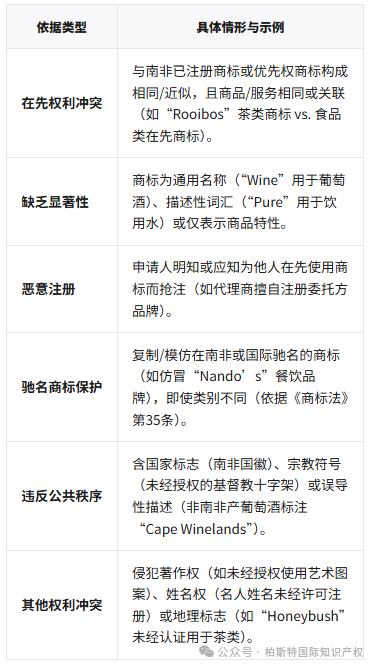- Knowledge
Preface:
1、 Trademark opposition acceptance agency
The Companies and Intellectual Property Commission (CIPC) is the statutory authority for trademark objections in South Africa, under the Department of Trade and Industry (DTIC), with specific functions including:
1. Review and Announcement:
Conduct formal examination (document completeness) and substantive examination (distinctiveness and prior conflict) on trademark applications.
The trademark that has passed the examination is published in the Patent Journal of South Africa and is subject to public supervision.
2. Jurisdiction over Objection Cases:
Accept objection applications, review legal basis, organize evidence exchange, and make administrative rulings.
3. Proxy requirements:
Foreign objectors must entrust a locally registered trademark agent in South Africa to submit the application (in accordance with Article 21 of the Trademark Regulations).
South African residents or businesses can submit their own cases, but it is recommended to entrust professional agents for complex cases.
Practical tips:In recent years, CIPC has implemented an electronic application system (e-filing), but paper documents still account for 60% of the total number of cases. It is recommended to submit them in parallel on two tracks.
2、 Timing of Trademark Objection
The exercise of the right of objection is subject to strict time limits, and the specific rules are as follows:
1. Announcement period calculation:
After the trademark passes the examination, CIPC will publish an announcement in the Patent Journal, and the opposition window is 3 months (calculated from the date of announcement).
2. Extension application:
The objector may apply for an extension once before the original 3-month period expires, with a maximum extension of 6 months (reasonable reasons must be submitted and an extension fee of approximately $50 must be paid).
3. Consequences of overdue:
Failure to raise objections within the deadline: The trademark will be approved for registration, and the objector can only protect their rights through revocation procedures (applying to CIPC) or court litigation (filing a lawsuit with the High Court), which increases the cost by about 4 times.
Monitoring suggestion:Subscribe to trademark announcement reminders through the CIPC official website, or use global trademark monitoring services such as Clarivate CompuMark for real-time tracking.
3、 Basis for Trademark Objection Application
Objections must be based on statutory reasons such as Articles 10, 11, and 24 of the Trademark Law, and the core basis includes:

Key points of evidence:We need to submit South African trademark registration certificates, sales records, advertising contracts, consumer survey reports, etc. to prove the possibility of confusion or malice.
4、 Trademark opposition process
The objection procedure is divided into five stages and is fully supervised by CIPC:
1. Submit objection application (stage 1-2 months)
The objector shall submit the TM3 form (objection notice), reasons and evidence, and pay the official fee (approximately $70).
2. CIPC formal review (stage 2-3 months)
CIPC reviews the compliance of documents, and if there are any omissions, they must be corrected within 21 days. Otherwise, it will be considered abandoned.
3. Respondent's defense (stage 3-6 months)
The objector shall submit the TM6 form (defense statement) and counter evidence within 3 months after receiving the notice.
4. Refutation by objector (stage 6-7 months)
The objector may submit supplementary evidence and legal opinions regarding the defense content within one month.
5. Written review and ruling (stage 7-18 months)
CIPC usually makes decisions based on written materials, and major cases may apply for a hearing (at an additional cost). The ruling results include:
Objection established: The trademark application is rejected, and the objector may appeal to the High Court of South Africa.
Objection not established: Upon approval of registration, the objector may file an administrative lawsuit with the High Court.
Relief mechanism:The losing party shall file a lawsuit with the court within 3 months after the award is served, and the deadline shall expire.
5、 Trademark opposition period
The average duration of the objection procedure is 12-18 months, with specific variables including:
1. Standard process duration:
Announcement period (3 months) → Defense period (3 months) → Refutation period (1 month) → CIPC ruling (5-11 months)
2. Extended cycle factors:
Overseas evidence requires Hague authentication or authentication by the South African embassy or consulate, with an additional 1-2 months;
Both parties apply for a procedural extension (if the defense period can be negotiated to be extended to 6 months);
CIPC case backlog (backlog rate of about 25% in 2023, high risk of delayed rulings).
3. Judicial litigation stage:If entering the High Court proceedings, an additional 2-4 years will be added.
Institutional challenges:
1. Written review is the main focus:CIPC rarely holds hearings, and relying on written materials may lead to deviations in the determination of key facts.
2. Difficult to prove malicious registration:The applicant needs to provide direct evidence of subjective malice (such as internal emails, contract breach records).
Practical Strategies and Institutional Trends
Although the objection system in South Africa is relatively sound, lengthy procedures and high judicial costs remain the main pain points. Enterprises can adopt the following strategies:
Priority registration:Designate South Africa through the Madrid System or use the priority of the Paris Convention to advance the layout.
Evidence pre storage:Keep sales invoices, exhibition records, and social media promotion data for the South African market (such as screenshots of Facebook South African regional advertisements).
Cross border collaboration:Utilize the Bangui Agreement to synchronously monitor trademark dynamics in member countries of the African Regional Intellectual Property Organization (ARIPO).
South Africa is advancing its IP Key Africa cooperation project with the European Union, and may introduce an accelerated objection procedure mechanism in the future. Companies need to closely monitor updates to CIPC policies.




